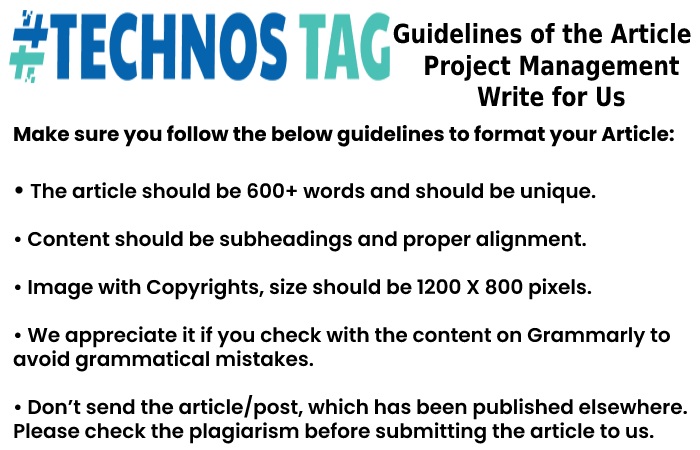Project Management Write For Us – A project forecast addresses the question: when will the project be completed, and at what cost? It implies an assumption based on the performance indicators that are being collected. The prediction obtained allows you to determine where the project is headed if it is within budget and if something needs to be changed.
What questions do you answer when managing a project?
When you manage a project, you answer questions like:
- What are the objectives?
- Who are the interested parties?
- Who will benefit?
- How do you expect to reach the goal?
- What is the impact of the project?
- What is the completion time?
- What risks can affect the project?
- Who is responsible for each task?
- What is considered a success, and how is it measured?
Why is it essential for a project manager to ask questions when starting a project?
A project manager must ask questions at the start of a project because:
- It allows answering the doubts of all those present.
- It makes it easy to visualize possible problems with the project.
- It minimizes the risk of ambiguity and brings clarity to tasks.
- Contribute to work based on data and not assumptions.
- Provides in-depth knowledge of all aspects of the client, the work team and the project itself.
- Increases the chances of success.
Why don’t project managers often ask questions?
In many cases, project managers do not ask questions in order not to be aggressive and to present themselves as efficient professionals in front of the client. In the first case, the cause is the underlying fear of displeasing the person in charge of the project. The second is the innate desire to build a facade of wisdom.
What topics should the questions a project manager should ask address?
The topics that should address the questions that a project manager must ask are:
- Project objectives.
- Related audience.
- Project success.
- Key milestones and delivery dates.
- Importance of the project.
- Possible obstacles.
- Project assets.
- Background.
- Trunk decisions.
- Level of risk that can be taken.
Top questions a project manager should ask at the start of a project.
The project analysis session is the perfect moment to lay the foundations for success. You will know everything you need to know to carry out your task. Or, at least, you should have access to the necessary data. Therefore, you should not remain silent during the analysis of the project. After all, its definition implies the raising of questions. Undoubtedly, there are questions that project managers must ask before planning a project. Asking the correct questions at the right time will save you more than one upset. Find out and do not hesitate to participate in all topics related to the new project. As a leader, you must have enough information, including background information, to make sound decisions. As you can imagine, there are many questions to ask when joining a new project to try to achieve success. Next, we present the most important ones.
1. Who is the client and the other interested parties in the project?
This is, without a doubt, the first question you should address in the project analysis session. Knowing the client in depth is essential. Understanding its history, values, position in the market and concerning the competition, and goals will help you develop the best strategies to promote the project.
Likewise, it is essential that you also understand the other parties interested in achieving this project. Who are they, and what is their interest? Who is the owner of the project? Is there a sponsor (or sponsors) of it? What weight do sponsors have in decision-making? Who, besides the company owner, has the right to vote when deciding? Do you have direct access to that person (is it the contact)?
2. What are the objectives?
Goals indicate where you are going. Without them, it is impossible to achieve success because it is too easy to lose your way. One of the questions that a project manager must ask in a project analysis is precisely this: what are the project’s goals?
Of course, you should not limit your doubts to the project’s objectives, but also try to find out the organizational goals of the company that has requested it. After all, all objectives must be aligned to contribute to the company’s growth. In the same way, you should make sure that each goal is specific, measurable, achievable, relevant, and time-bound.
3. How is project success defined (and measured)?
With the project objectives determined, understood, and written down, it is time for another of the big questions project managers must ask: what is the definition of success for this particular project? In general terms, the answer is provided by the objectives. However, this interrogation gives rise to a deeper evaluation of the situation. Suppose a 40% increase in online conversion is considered a smashing success; what percentage would still be considered a success without reaching that number? And what percentage would be insufficient and, therefore, a failure?
In the same way, there may be different variables to be analyzed,; thus, it would be necessary to stipulate in writing how the results obtained for each of them will be measured. This point is of great importance since a result less than that stated in the objective can be considered a success, similarly, depending on the particular circumstances. Pointing this out in advance will improve the later rating of the project.
4. What are the critical project milestones and delivery deadlines?
Each project comprises a series of tasks that can be dissected into main and secondary ones. Experts recommend the use of a task manager to point out dependencies between them and thus facilitate the progress of the project. Among all these activities to be carried out, some are more relevant. These are, without a doubt, the critical milestones of the project.
When one of these critical milestones is delayed, the project’s timely completion is jeopardized. For this motive, it is essential to determine from the project analysis session which significant events are of critical importance for the entire project. Subsequently, the completion date of each milestone should be analyzed and recorded in the task manager, always with a time margin in the event of unforeseen events. In this way, the actions would be articulated to obtain substantial effects with the best maximization of resources.
5. Why is this project so important?
Although every project initiated by the company is essential, some projects become true pillars for the company. For this reason, this is one of the questions that a project manager should ask without delay. How does the success of this project affect the company? And, what are the implications of the failure of this project?
In some cases, the investment made is so high that failure is a variable that cannot be contemplated since the company’s survival depends on the project’s success. Realizing this before you start will allow you to make informed decisions and know that, with the enormous repercussion of failure, it is worth taking a little more risk to reach the top.
6. What are the possible obstacles that could hinder the fulfilment of the project?
In the project analysis session, you should analyze with the whole team the possible obstacles to face. Investigating the market, the competition, the risks involved in each task and the delays that could affect them is essential.
Also, each work team member could provide their thoughts on the project from their area of expertise. After all, experience allows you to identify risks in advance. For example, risks might be inherent to the overall project objective or particular tasks. Those who have already lived with these problems will surely be able to see the signs and indicate them.
7. What are the assets of the project?
As you can see, there are many questions that a project manager must ask at the beginning of a project. Do not forget to include, among them, one about the project’s assets. These include all the policies, procedures, knowledge bases, and plans that have been approved and put into practice by the organization. In short, it is a know-how that can help you bring the project to a successful conclusion.
Take the time to understand company policies and procedures related to managing the project and communication. Find out about each step of the product life cycle, the planning models and the collaborative tools available. What are the procedures for financial control, incident or defect management, and the necessary authorizations? Is there, perhaps, a final project audit? And, above all, what is the budget allocated to the project?
8. Has this project (or a similar one) been attempted in the past, and what has happened?
Deprived of doubt, this is one of the questions that a project manager must ask without fail. Knowing the answer will favour an efficient approach to the project. Why? Simply you will be able to discern the key points that have led the analyzed project to success or failure.
If there is a similar project or a previous attempt to carry out the same project, immerse yourself in its planning, execution and evaluation. Examine each step taken. Think about what you would have completed differently and what is the same. Isolate the variables and then look at them together. Could what finally happened have been foreseen? How? But, ultimately, everything learned at the service of your project.
9. What are the most critical decisions that need to be made? – Project Management Write For Us
Identifying sensitive areas favours the detection of essential tasks and, therefore, the most relevant decisions. Talk to the client or your manager about it. What are the decisions they consider crucial and why?
In general, this one of the questions to ask about projects that not often asked. Project managers often put this issue aside since they believe that no one should tell them the fundamental decisions to be made. However, obtaining an outside view or the opinion of another professional with experience in similar projects can contribute to achieving success.
10. How much risk can we take to try to achieve success? – Project Management Write For Us
In the project analysis, do not hesitate to question the level of risk that you will be able to take throughout the execution to achieve the goals. Of course, the answer will closely linked to the repercussion that the failure or the achievement of the project has for the company.
If you’re managing a project with critical implications for a company, you may be able to, and even need to, take greater risks. Ultimately, business growth or subsistence will depend on it. For this reason, this is one of the questions that a project manager should ask without delay.
Conclusions on the questions that a project manager should ask at the beginning of a project
There are no guarantees for success. In a project, many things can go wrong. The situation can affect the market. The tasks can delayed and damage the final result… However, you can take some measures so that reaching it is closer to a reality than to a utopia. The first of these steps is simply asking the questions a project manager should ask.
Get involved with your project from the very beginning. Think of him from different perspectives. Take note of your doubts and those data that you have not received (or have not been clear). During the project analysis session, address this situation. Maybe you feel weird asking a lot of questions. However, it the best way to prepared for your work. Only then can you run the project efficiently.

Likewise, You can submit your articles at contact@technostag.com
How to Submit Your Project Management Articles (Project Management Write For Us)?
That is to say, To submit your article at www.Technostag.com, mail us at contact@technostag.com
Why Write for Technostag – Project Management Write For Us
Project Management Write For Us
That is to say, here at Technostag, we publish well-researched, informative, and unique articles. In addition, we also cover reports related to:
team
project documentation
scope
budget
optimize
allocation
decision-making.
project
business as usual (or operations)
management
project
cross-functional teams.
project manager
project champion.
Guidelines of the Article – Project Management Write For Us
Search Terms Related to Project Management Write For Us
[write for us software]
[write for us page]
[write for us + technology]
[write for us culture]
[write for us blogging]
[write for us food]
[write for us finance]
[write for us technology API]
[“[food and drink]” +”write for us”]
[write for us + travel]
[“write for us” + lifestyle]
[“write for us” + organic food]
[write for us restaurant]
[write for us + fashion]
[“write for us” + free]
[write for us technology]
Related Pages
Gadgets Write For Us
Machine Learning Write For Us
Digital Marketing Write For Us
Anti Virus Write For Us
Gaming Write For Us
Hacking Write For Us
Smartphone Write For Us
Web Design Write For Us
Big Data Write For Us
Cloud Computing Write For Us
Software Write For Us
VoIP Write For Us
Data Center Write For Us
Computer Write For Us
5G Write For Us
CCleaner Write For Us
CRM Write For Us
Analytics Write For Us
Data Science Write For Us
Data Analytics Write For Us
Python Write For Us
Tableau Write For Us
Saas Write For Us
Education Write For Us
Data Recovery Write For Us
IoT Write For Us
Android Write For Us
Malware Write For Us
E-commerce Write For Us
PHP Write For Us


